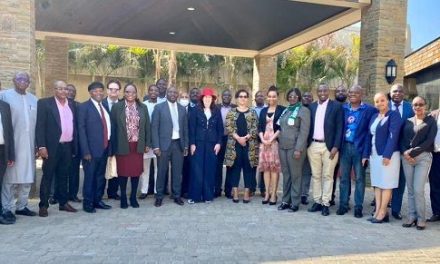
Public frustration forces judiciary to look at criminal justice system reforms

The Konrad Adenauer Stiftung sponsored the Magistrate’s Forum for Legal Reforms, at Lower Courts, which kicked off this week at the Safari Court Hotel.
The forum is aimed at ensuring that lower courts gear themselves for legislative reform that is expected by 2019 and discuss issues pertaining to the criminal justice reform task force, criminal case backlogs, court performance as well as change and diversity management within the courts.
Hon. Peter Shivute, Chief Justice said they are all aware of the public’s frustration with aspect of the criminal justice system, especially, the granting of bail to repeat offenders, the rather long delays between arrest, appointment of legal aid counsel, first appearance at court and the ultimate finalisation of criminal cases.
“Therefore I acknowledge that with the ever changing times, our criminal justice reform has not kept pace with emerging issues within our criminal justice system,” he added.
He explained that it is for this reason that a consensus was reached that all institutions involved in the criminal justice system must cooperate and coordinate their activities without compromising their autonomy and functional independence.
“I have set up a Criminal Justice Reform Task Team consisting of various stakeholders in the criminal justice system, under the stewardship of the Hon. Deputy Chief Justice, which is a muti-disciplinary and multi-sectoral body aiming to diagnose the problems afflicting the efficiency and effectiveness of our criminal justice and to recommend solutions to the identified problems,” he added.
Hon. Petrus Damaseb, Deputy Chief Justice of Namibia said they have decided it is time to act and to stop the blame game and to sit under one roof as stakeholder to find solutions.
“We have come with action plans, which include the introduction of reception courts, the availability of magistrates on a 24 hour basis to issue protection orders in gender based violence matters, the integration of case management system to enable magistrates to be in control of the litigation of cases, training of magistrates, prosecutors, lawyers and law enforcement agencies on issues such as bail, guilty pleas, plea bargaining, investigations and case management and increasing the number of magistrates at courts to reduce the backlog,” he added.
He said the idea behind reception courts is to be an early intervention tool to asses the trial readiness of cases and to weed out related interlocutory issues and to get cases ready for trail as soon as possible. He also stated that it is very difficult to plan and to develop policy without reliable statistic.
“The integrity of data in the Lower Courts remains a huge challenge and statistics are not readily available, therefore the collection and collation of data needs to be prioritised if we are to improve service delivery”.
Damaseb also focused on the very low finalistation rate of cases, where a robust performance management system needs to implemented, which must be lead by the leadership of the magistracy.
“Therefore the administration of the Judiciary equally has been tasked to urgently address issues relating to the performance of interpreters, legal clerks and ITC infrastructure, because the late processing of records for the purpose of review and appeals to the High Court remains a serious problem,” he emphasised.
Furthermore, Damasem focused on the reports and complains about courts not starting on time, magistrates not being available for unexplained reasons when cases are ready to proceed.
“We must be aware that people are watching and talking about our conduct and we need to do an introspection and change our attitudes and behaviour so that this kind of behaviour, if true, does not happen and remember there is no smoke without fire,” he concluded.












































